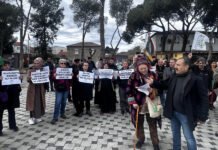Former Zaman daily Ankara Representative Mustafa Ünal, who is standing trial after 419 days in pretrial detention, said on Monday that he and other colleagues in the same case are journalists who expressed their views in Zaman, not terrorists.

The trial of 30 journalists and newspaper executives, 21 of whom are in jail, from the now-closed Zaman newspaper started on Monday, after a wait of 419 days in pretrial detention for most of them. The case is being heard by the İstanbul 13th High Criminal Court in the notorious Silivri Prison compound. The journalists are facing “terrorism” and “coup-plotting” charges due to having worked and written for the Zaman daily, which was linked to the Gülen movement, accused of mounting a coup attempt last year in July.
Speaking during the hearing at the İstanbul 13th High Criminal Court in the Silivri Prison compound on Monday, Ünal underlined that he was a journalist who was trying to survive by expressing his views in Zaman before it was shut down by the government. He also said he knows many members of the ruling Justice and Development Party (AKP) personally.
“I want to ask them [AKP members]: Are we terrorists?”
Underlining that he is standing trial for writing against the government, Ünal said he has never been afraid of being tried for the things he has written. “However, the indictment will go down in the history of the judiciary and the media for not having even the suspicion of a crime having been committed, let alone evidence of one,” he added.

Also testifying during the hearing on Monday, former Zaman night editor İbrahim Karayeğen said his name is among the suspects in the case; however, he doesn’t even know what charges he is facing despite having been held in pretrial detention for 419 days.
Underlining that he wants all putshchists who attempted a coup on July 15 of last year to be punished with the most severe of penalties, Karayeğen said he had been working at Zaman for 12 years and continued to work as a night shift editor with the new administration after the daily was seized in March 2016.
“Someone may ask why I continued to work at Zaman and why I didn’t leave it [after the government started to target it]. That is a cruel question. How could I find a place to work as a journalist when thousands of other colleagues were unemployed,” he said.
Denying that he used the infamous ByLock smart phone application, Karayeğen said he has never downloaded the app, believed by Turkish authorities to have been used as a communication tool among followers of the Gülen movement, which accused by the government of being behind the failed coup.
He also said he was detained after the abortive coup as he was trying to travel abroad, which is his legal right.
Karayeğen’s daughter Zeliha Esra Karayeğen was also arrested by a court on Aug. 10 for having an account in the government-shuttered Bank Asya and for allegedly downloading the ByLock application.

Academic and columnist Şahin Alpay said in his defense that he was writing for Zaman because he was unable to find the opportunity to write for other dailies and that he wanted to earn some additional income by sharing his opinions.
“I have been a victim of military coups all my life. I had to ask for asylum from Sweden after the March 12, 1971 coup attempt,” said Alpay.
Columnist Ali Bulaç said the article that was presented as the cause for arrest in the indictment was not written by him, and he denied allegations accusing him of membership in the Gülen movement.
“What is my crime? Have I used a gun, attended coup plotting meetings, thrown a bomb?” asked Bulaç.
Underlining that he exercised his freedom of speech, relying on the constitution and the law, Bulaç said he supported the presidential system proposed by President Recep Tayyip Erdoğan and did not target him in his articles.
The distribution director of several newspapers, including Zaman, Alaattin Güner, said the distribution center was not involved in the management of content in the dailies and only ensured their distribution to subscribers.
The Zaman daily was first unlawfully seized by the Turkish government on March 4, 2016 and then closed down by government decree in the aftermath of a failed coup attempt on July 15, 2016.
The daily was selling as many as 1.2 million copies a day at its peak and was covering judicial investigations into corruption allegations and illegal arms shipments to jihadists in Syria, which rattled the government of then-Prime Minister and now President Erdoğan.
A total of 30 defendants are named in the indictment, 21 of whom are in jail. Mümtaz’er Türköne, Şahin Alpay, Ali Bulaç, Ahmet Metin Sekizkardeş, Ahmet Turan Alkan, Alaattin Güner, Cuma Kaya, Faruk Akkan, Hakan Taşdelen, Hüseyin Belli, Hüseyin Turan, İbrahim Karayeğen, İsmail Küçük, Mehmet Özdemir, Murat Avcıoğlu, Mustafa Ünal, Onur Kutlu, Sedat Yetişkin, Şeref Yılmaz, Yüksel Durgut and Zafer Özsoy have been in pretrial detention for 14 months as the judges repeatedly rejected challenges to their detention despite the fact that there was no reason to keep them in jail pending trial.
Ahmet İrem, Ali Hüseyinçelebi, Süleyman Sargın, Osman Nuri Arslan, Osman Nuri Öztürk, Lalezer Sarıibrahimoğlu, Nuriye Ural and Orhan Kemal Cengiz are also named as suspects in the indictment, but they are being tried without detention. Professor İhsan Duran Dağı, who used to work as a columnist for Zaman, is cited as a fugitive in the indictment.
Turkey is the biggest jailer of journalists in the world. The most recent figures documented by the Stockholm Center for Freedom (SCF) has showed that 284 journalists and media workers are now in jails as of September 18, 2017, most in pre-trial detention languishing in notorious Turkish prisons without even a conviction. Of those in Turkish prisons, 259 are arrested pending trial, only 25 journalists remain convicted and serving time in Turkish prisons. An outstanding detention warrants remain for 135 journalists who live in exile or remain at large in Turkey.
Detaining tens of thousands of people over alleged links to the movement, the government also closed down more than 180 media outlets after the controversial coup attempt. Turkey’s Contemporary Journalists’ Association (ÇGD) recently announced that more than 900 press cards were cancelled. (SCF with turkishminute.com)















